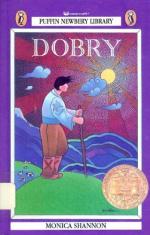|
This section contains 318 words (approx. 2 pages at 300 words per page) |

|
Because "peasant" carries negative connotations in American usage, the references to Dobry and his neighbors as peasants may at first seem somewhat snobbish, but the reader quickly realizes the word is used in the European sense, meaning a member of a rural community. In fact, social rank carries little importance in Dobry's village; for example, Semo the schoolteacher and his "Wheat Binder" fiancee are equal in status, and the mayor's pomposity is emphasized more than his authority.
Characters gain recognition based upon accomplishments, as in the cases of Grandfather's stories, Roda's farming, Hristu's shoes, and Dobry's dive to retrieve the gold crucifix.
In general, Dobry and his neighbors are tolerant of other cultures. They admire the artistry of the Macedonian jamal-maker Kolu. They welcome gypsies to the village and greet the arrival of the gypsy bear with great ceremony. The Bulgarian villagers respect the gypsies' wisdom...
|
This section contains 318 words (approx. 2 pages at 300 words per page) |

|




